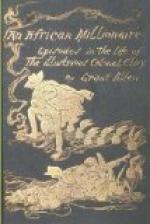So, by way of pursuing it, Charles retired to Seldon.
“The longer the man goes on, the worse he grows,” he said to me one morning. “He’s just like a tiger that has tasted blood. Every successful haul seems only to make him more eager for another. I fully expect now before long we shall see him down here.”
About three weeks later, sure enough, my respected connection received a communication from the abandoned swindler, with an Austrian stamp and a Vienna post-mark.
“MY DEAR VANDRIFT.—(After so long and so varied an acquaintance we may surely drop the absurd formalities of ‘Sir Charles’ and ‘Colonel.’) I write to ask you a delicate question. Can you kindly tell me exactly how much I have received from your various generous acts during the last three years? I have mislaid my account-book, and as this is the season for making the income tax return, I am anxious, as an honest and conscientious citizen, to set down my average profits out of you for the triennial period. For reasons which you will amply understand, I do not this time give my private address, in Paris or elsewhere; but if you will kindly advertise the total amount, above the signature ‘Peter Simple,’ in the Agony Column of the Times, you will confer a great favour upon the Revenue Commissioners, and also upon your constant friend and companion, CUTHBERT CLAY,
“Practical Socialist.”
“Mark my word, Sey,” Charles said, laying the letter down, “in a week or less the man himself will follow. This is his cunning way of trying to make me think he’s well out of the country and far away from Seldon. That means he’s meditating another descent. But he told us too much last time, when he was Medhurst the detective. He gave us some hints about disguises and their unmasking that I shall not forget. This turn I shall be even with him.”
On Saturday of that week, in effect, we were walking along the road that leads into the village, when we met a gentlemanly-looking man, in a rough and rather happy-go-lucky brown tweed suit, who had the air of a tourist. He was middle-aged, and of middle height; he wore a small leather wallet suspended round his shoulder; and he was peering about at the rocks in a suspicious manner. Something in his gait attracted our attention.
“Good-morning,” he said, looking up as we passed; and Charles muttered a somewhat surly inarticulate, “Good-morning.”
We went on without saying more. “Well, that’s not Colonel Clay, anyhow,” I said, as we got out of earshot. “For he accosted us first; and you may remember it’s one of the Colonel’s most marked peculiarities that, like the model child, he never speaks till he’s spoken to—never begins an acquaintance. He always waits till we make the first advance; he doesn’t go out of his way to cheat us; he loiters about till we ask him to do it.”
“Seymour,” my brother-in-law responded, in a severe tone, “there you are, now, doing the very thing I warned you not to do! You’re succumbing to a preconception. Avoid fixed ideas. The probability is this man is Colonel Clay. Strangers are generally scarce at Seldon. If he isn’t Colonel Clay, what’s he here for, I’d like to know? What money is there to be made here in any other way? I shall inquire about him.”




